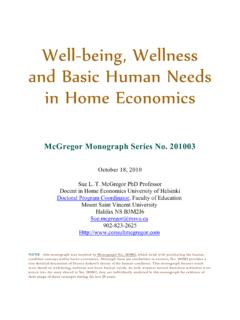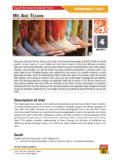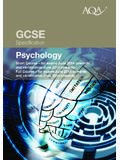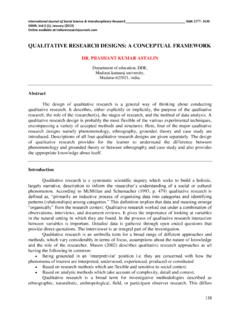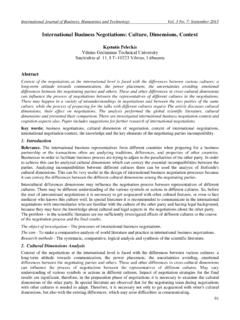Transcription of MBA Management Project Report - enodo
1 Intercultural assessment of sustainability Intercultural adaptability of oekom research AG s Corporate responsibility Rating (CRR) According to criteria of social and cultural sustainability by Simeon Ries 2001 MBA Management Project Report Management Project submitted to NIMBAS Graduate School of Management in accordance with the rules of the University of Bradford Management Centre in partial fulfilment of the requirements for the degree of Master of Business Administration 1 Key Words and Abstract Simeon Ries Title: Intercultural assessment of sustainability Keywords and phrases in this document are Social and cultural accountability Intercultural challenges for communication Global ethics and their application Dimensions of culture Managing Internationalisation and Growth Abstract oekom research s assessment of companies according to criteria of environmental, social and cultural sustainability is challenged by scarce response by Japanese companies.
2 After the presentation of the rating agency and its tools, this Project analyses the expressed explanations both from the German and the Japanese perspective with support by Trompenaars and Galtung/ Welfords contributions. The definition of sustainability is not static, but describes the means of the process towards a more sustainable development. The Japanese contribution challenges the Western concepts. It is not the question, which side provides the better framework, but how the intercultural dialogue is enabled. oekom s CRR is perceived in this context. The author recommends to develop a cultural self-awareness and to engage in the global debate, also as a means to improve the company s efficiency and profitability.
3 Personal note: The events in New York on September 11, 2001 can be interpreted as intense symbols in the context of an ill-defined global agenda of intercultural communication, which remains centred on Western concepts. The author hopes, that this interruption of the Western normality leads to a new acceptance of the existence of other perspectives, leaving behind the dualism of good and bad , civilised and uncivilised , and opens space for new ways of doing business, based on cultural self-awareness and a stronger emphasis on the life of the global community. This includes the spiritual path towards sustainability.
4 2 Preface The foundation idea for this work rooted in the intent to work on the problem of the adaptability of criteria to assess a company s performance in the context of sustainability. It was agreed with the supervisor on a methodology to jump into the ocean of the issue and find the some islands, where contributions to the path towards sustainability are to be developed. Academic approaches do not provide definitions or frameworks which can easily be applied, but seem to satisfy the demand for educational tools.
5 Sustainability is conceived as a process, whose dynamics change according to new developments in politics, research and experience. The actual debate works on the description of the traffic signs, not the finish of the global development. In this context, the academic approach engages in the advertisement of the quest for a sustainable development, providing arguments for a new fundamental orientation of the business and politics. For Management , sustainable development mostly is conceived as strategy, that will ensure the company s survival on the long term.
6 This is closely linked with the global environment. In M. Porters framework of the 5 forces of the competitive environment, nature, future generations and the development of human cultures have to be added. This influences a businesses agenda, focussing on its impact on its environment and the long term sustainability of its basic assumptions and derived business practices. For the environmental issues, a global standard, ISO 14000 has been developed and is increasingly accepted all over the world. Based on the approach of the triple bottom 3line, three areas of development- financial, environmental and social prospects should be included into the Management agenda.
7 For social issues, national legislation often is a good benchmark for a company s performance. In the context of cultural sustainability, one can perceive the cultural bias of the criteria, when it comes to assess a company s performance. New standards have been developed, that focus not on hard facts , but in the quality of the process of decision making as well as the movement of a company towards a more sustainable business practice. What can be assessed, is therefore, if a company includes issues from the sustainability agenda into it s practices or not, and how this process is managed.
8 Due to the enormous variety of the cultural contexts worldwide, and their dynamic character, a fixed set of criteria cannot be articulated. Instead, standards such as AA1000 in the provide measures and benchmarks for the process of implementation and decision making in a single organisation. Unfortunately, this could not be adopted too, because the subject of this work is not a single company, but the difficulties coming up in the intercultural context. The author had to decide, if the Report should analyse oekom researchs situation- an approach that will be based on only little information, or the broad question of the intercultural compatibility of criteria to asses a company s performance.
9 The solution was to perceive oekom research as part of the dialogue about sustainability on a global- in this case German-Japanese scale. It traces oekom researchs business opportunity by analysing the development of the issue in Japan, and the experience with 4 Japanese partners. Oekom researchs situation and managerial problems will frame the search for an improved dialogue. The managerial problem therefore shifts to the question of Japans path towards the future, and the contribution oekom research might offer. For this work and the development of the Management Project , the author had to face the equivalent systemic difficulties.
10 No frameworks seem to apply to the issue in question, because they describe the nature of the way towards sustainability. Should the author now analyse the situation of the company oekom research , or engage in the internal debate about CRR s criteria? It remains difficult to link a managerial issue, such as oekoms strategy and marketing practices, to the global debate about sustainability. There are signs for a upcoming opportunity on the Japanese financial market, in which oekom could differentiate. But it is obvious, that under the actual situation, oekom simply has not the resources to pursue such a strategy, but might provide an important contribution for the Japanese debate on ethics.
